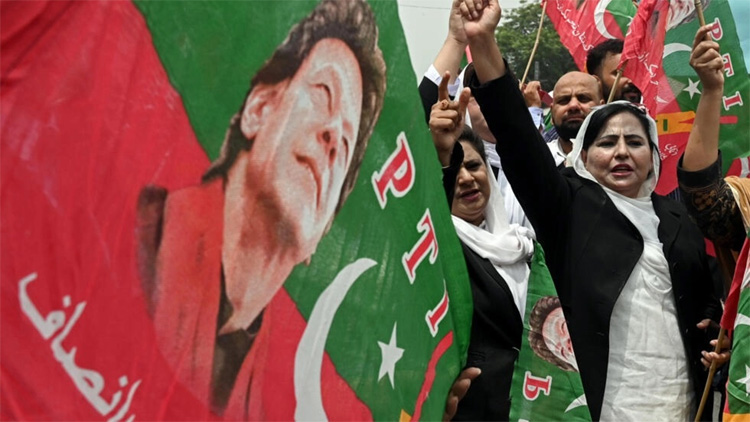Jailed Pakistan former prime minister Imran Khan ‘in good spirits’
Former Pakistan prime minister Imran Khan was in good spirits despite tough conditions in jail, his spokesman said Monday, following a graft conviction that has ruled him out of contesting elections due later this year.
The former international cricket star was arrested Saturday and whisked to prison after being found guilty in one of the more than 200 cases he has faced since being booted from office by a vote of no confidence in April 2022.
There were small, scattered protests — including outside Lahore High Court, where a few dozen people gathered — but Khan’s street power has drastically diminished since authorities cracked down three months ago and rounded up thousands of his supporters.
A lawyer met Khan on Monday at a century-old jail on the outskirts of historical Attock city, around 60 kilometers (40 miles) west of the capital, to obtain power of attorney so his team could press ahead with a series of legal challenges.
“He is being held in deplorable conditions not fit for any human, but he is in good spirits,” Khan’s spokesman Raoof Hasan told AFP.
“He said to ‘tell the people that I will not compromise on my principles’.”
The 70-year-old is being held in a so-called “C-class cell,” sleeping on a mattress on the floor and with only enough room for a prayer mat. There is little access to daylight, and a fan but no air conditioner in the summer heat, Hasan said.
Lawyers were able to gain power of attorney from Khan, allowing them to file a bail application on his behalf and also appeal for him to be moved into an “A-class cell.”
“We’re hopeful that we will be able to secure bail and the decision will be suspended and the disqualification revoked,” said Hasan.
At a court hearing that Khan did not attend on Saturday, a judge found him guilty of failing to properly declare gifts he received while in office and sentenced him to three years in jail.
The sentence disqualifies Khan from taking part in elections, although many politicians — including current Prime Minister Shehbaz Sharif and his brother, former premier Nawaz Sharif — have recovered from convictions or had them overturned to make a comeback.
Parliament is due to be dissolved on Wednesday, days ahead of the end of its natural term, giving the interim government 90 days to hold an election.
But there is already speculation the vote could be delayed following the release at the weekend of the country’s latest census data.
Law minister Azam Nazeer Tarar told a local TV channel that constituencies would have to be redrawn according to the new census, warning there could be a delay to polls of up to two-and-a-half months.
Khan’s arrest and detention for three days in connection with the same case in May sparked deadly violence, with his supporters taking to the streets in the tens of thousands and clashing with police.
It also prompted the crackdown that saw almost all of his top leadership arrested or forced into hiding, leaving the party scrambling to set up a replacement decision-making body.
Khan’s Pakistan Tehreek-e-Insaf (PTI) party won a by-election over the weekend, and in a second vote came behind an independent candidate, with both polls held in his stronghold of Khyber Pakhtunkhwa province.
“His being in prison is not going to dent his popularity,” Hasan said.
“He is the leader of the people and there is every reason for the establishment to sit down and talk to him.”
UN Secretary-General Antonio Guterres stressed “the need to respect the right to peaceful assembly,” his deputy spokesman Farhan Haq told reporters Monday.
He also urged “all parties to refrain from violence” and for Pakistan’s authorities “to respect due process and the rule of law,” Haq said.
In the eastern city of Lahore, where Khan was arrested Saturday, a few dozen lawyers and PTI supporters gathered outside the High Court to protest against his conviction.
“God willing, we lawyers will continue to stand firm against this illegal and unlawful ruling like a solid wall,” said Irfan Faiz.
In nearby Gujranwala, a demonstration by a dozen or so lawyers was broken up by police, while in Muzaffarabad in Pakistan-administered Kashmir, around a hundred party workers rallied.
The reaction so far has been vastly different to the outpouring of rage that followed his first arrest — even on social media, with half as many Facebook posts mentioning Khan’s name.
“The muted response to his arrest is because of the full-throttle crackdown on PTI workers after the first arrest,” columnist Usama Khilji told AFP.
“The arrests of PTI workers post the May arrest of Imran Khan coupled with draconian laws passed in haste by (the coalition government) have had a chilling effect on Pakistani citizens.”

